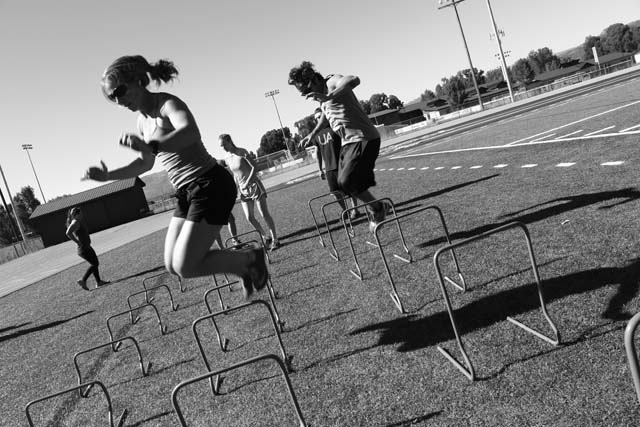By Rob Shaul
Through the Mountain Tactical Institute, we have several mountain-focused studies in the works which we hope to complete this fall and winter.
1) FreeSkier Fitness Testing, Pre and Post Dryland, Pre and Post Ski Season
The first two day’s of this year’s dryland training for our pro FreeSkiers was spent on fitness testing. We put our skiers through an extensive battery of fitness and physiological assessments:
(1) Height/Weight
(2) Modified Bass Test – Dynamic Balance
(3) Vertical + Depth Jump Sequence on Just Jump Mat – Power
(4) Max Rep Pull Ups – Upper pulling strength
(5) Max Rep Seated Military Press @ 25/35# in 60 seconds – Upper pressing strength
(6) Triple Broad Jump for Distance – Power efficiency
(7) 30/30 Sandbag Keg Lift for Reps @ 40/60# – Chassis Integrity
(8) 300m Shuttle for Time – Anaerobic Power
(9) 40m Sprint for Time – Test of Speed
(10) Run 3 Miles for Time – Test of Aerobic Capacity
We plan to re-test our skiers at the end of their dryland work in October, and prior and post ski season in December and April.
Our focus is on the impacts from actual skiing. Do our athletes become more powerful (vertical jump), increase work capacity (300m shuttle) or become faster (40m Sprint) from primarily skiing? Does their balance increase? Upper body strength decrease? Core strength change?
2) Ice Climbing – Interval Training Effects on Climbing Performance
One of the methodologies we use to train ice climber’s is interval training – somewhat similar to interval training using sprinting and other modes of activity.
On of my long term research questions is which duration of training (short for strength, medium for work capacity, or long for stamina) has the greatest effect on climbing performance. Our climbing cave is unique in that in addition to system boards, we also have bouldering routes established for climbing tools, and can use a “V-Sum” as a measure of climbing ability.
Lab rats permitting, we hope to divide them into three groups based on interval training duration, and pre- and post test their climbing ability for the greatest improvement.
If we can identify the interval which has the greatest affect on increasing climbing ability, we can modify our programming accordingly to emphasize it.
3) Backcountry Hunter Fitness Demands Survey
Backcountry hunting is a growing sport based on the number of clothing companies which have begun making high-end, lightweight, technical, camouflaged hunting clothing. For example, Under Armor launched a new high end line of hunting clothing this year. We recognize backcountry hunters as unique mountain athletes, and are interested in the fitness demands of a typical hunt. We have created a survey to collect fitness demand information such as vertical feet gained and lost, hunting pack weight, pack out (meat) weight, total mileage covered, etc.
In many states, bow season begins mid-August and the season extends through October. After the season, we’ll compile the data and report back what we found. Are you a backcountry hunter? Pls complete our survey here:
4) Impacts of a Busy Guiding Season
As part of the Alpinist Project, prior to the busy guiding season we conducted a battery of physiological and fitness assessments on local mountain guides. We intend to re-test them at the end of the guiding season in mid-September in an pilot study to identify the fitness demands and physiological impacts of a busy guiding season.
5) Differences and Similarities in response to physical danger (exposure) between professional FreeSkiers and Special Forces Operators with multiple Combat Deployments.
We have a unique place in working daily with both professional mountain athletes like FreeSkiers, and military professionals like special forces operators. Both populations face exposure regularly as part of their sport/work. We’re interested in how each population responds to and accommodates to their unique exposure and if there are any differences and similarities between the two populations.
We hope to work with a PhD assigned to one of the Special Forces groups on this project.

